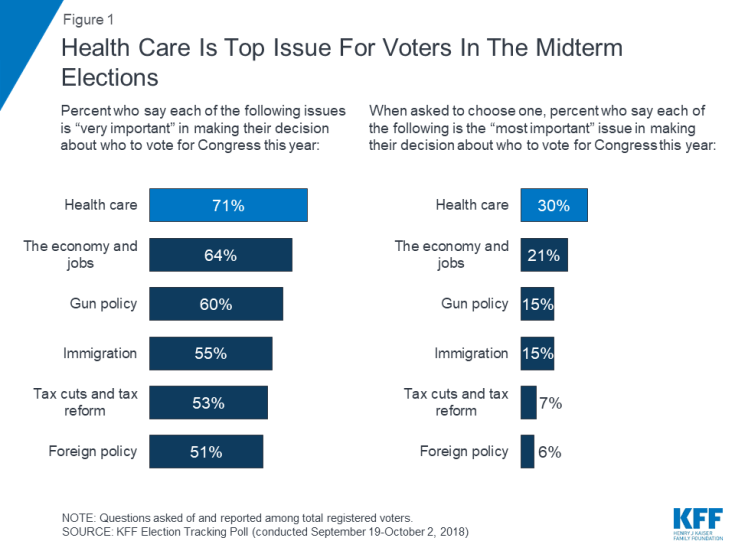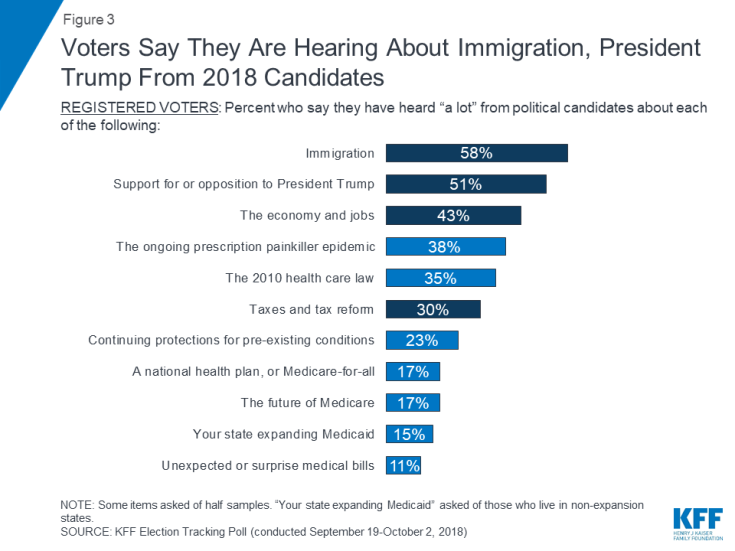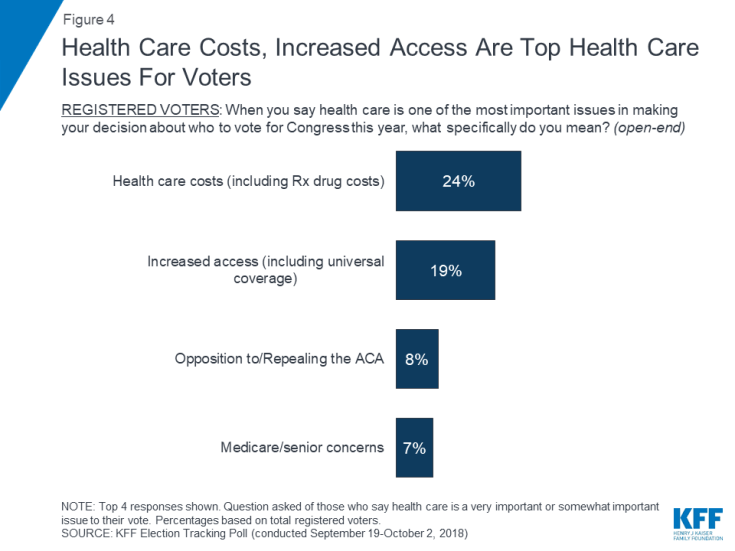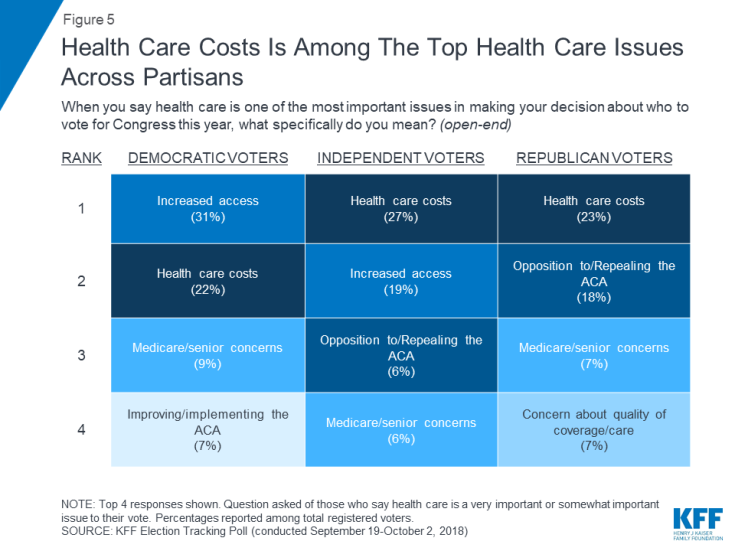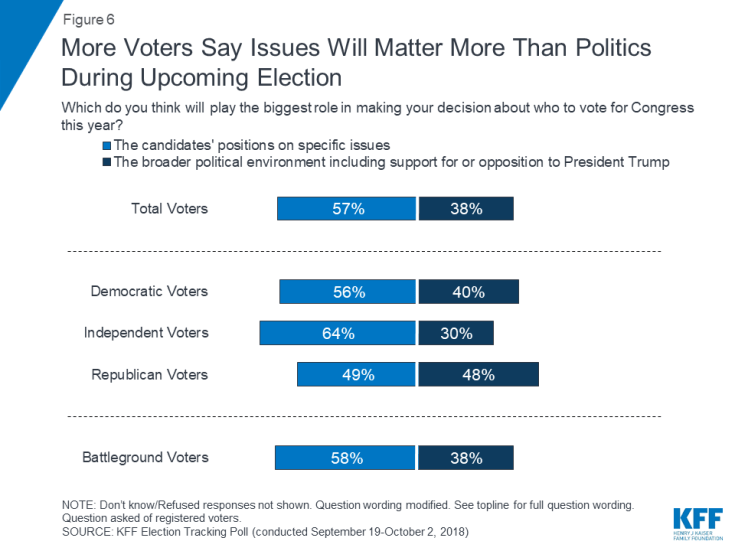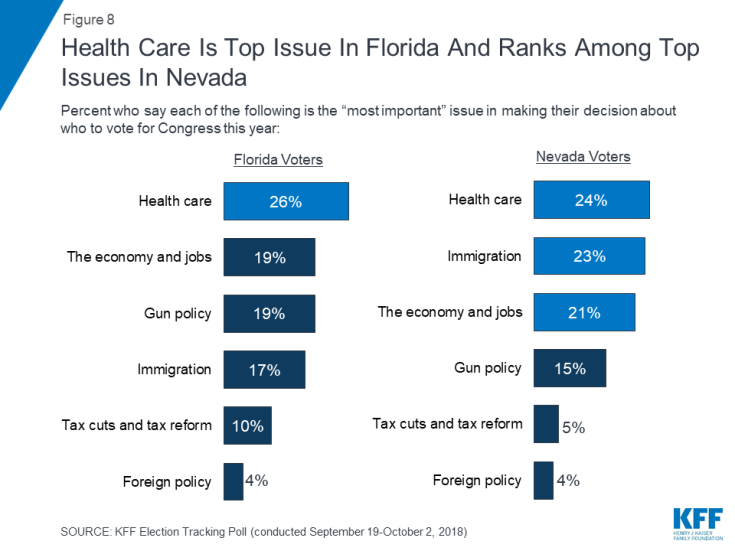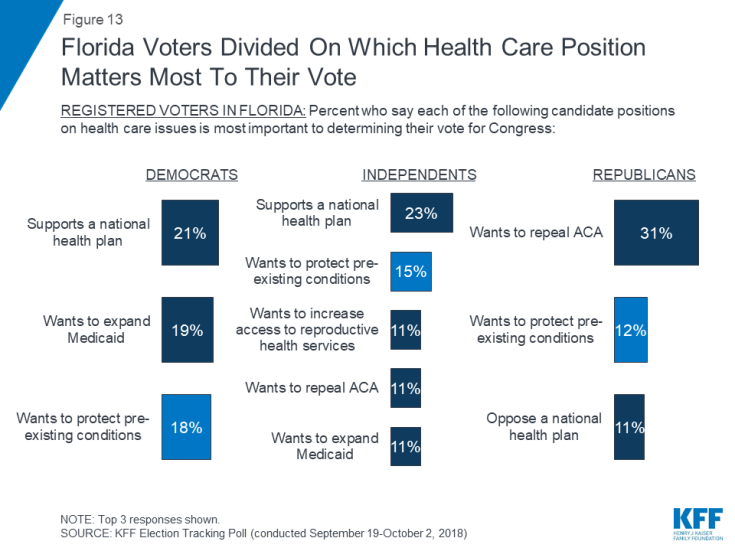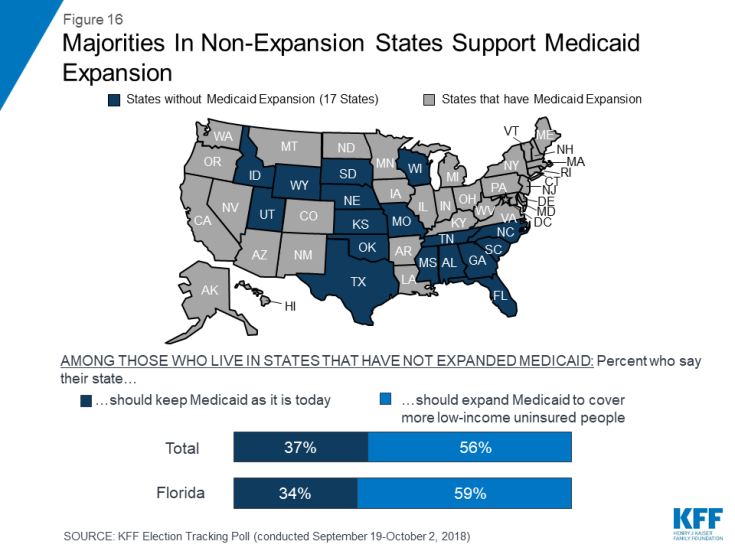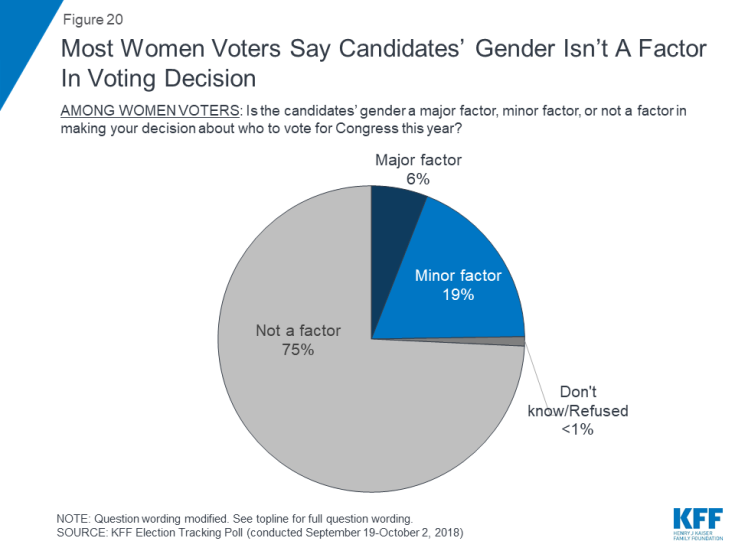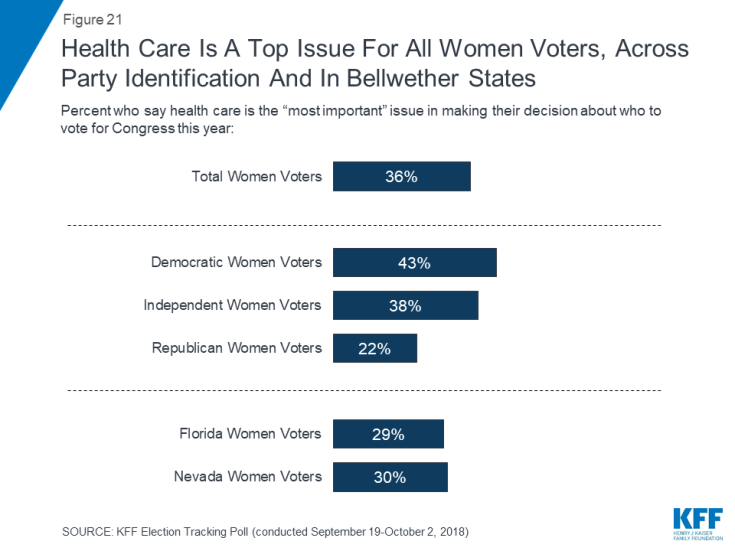KFF Election Tracking Poll: Health Care in the 2018 Midterms
Key Findings:
- In an expansive look at the 2018 midterm elections, the latest KFF Health Tracking Poll includes an in-depth examination of the role health care may be playing in midterm elections nationally, as well as in Florida and Nevada, two bellwether states with competitive Senate and Gubernatorial elections in which candidates from both parties are talking about health care issues.
- A majority of voters – nationally, in battleground areas with competitive elections, and in Florida and Nevada – say health care is “very important” in making their voting decisions for Congress this year, and at least a quarter choose health care as the “most important issue,” topping all other issues. Health care ranks lower for Republican voters, behind immigration and the economy and jobs, but tops the list for Democrats and independents. Health care costs unite voters nationally and in the bellwether states, with voters offering costs as the top health care issue in this election. Other issues vary by partisanship with partisan voters mentioning party platform issues such as increasing access and repealing the Affordable Care Act (ACA).
- A majority of Florida and Nevada voters say they are more likely to vote for a candidate who supports maintaining the ACA’s protections for people with pre-existing conditions, making this the most popular candidate position on health care across partisanship in both bellwether states. Slightly more than half of people living in Nevada and Florida say they or someone in their household has a pre-existing condition.
- Medicaid expansion is another health care issue that could be on the minds of voters living in non-expansion states (including those living in states with Medicaid expansion ballot measures). In Florida, where the Democratic gubernatorial candidate supports Medicaid expansion, majorities of Democratic voters (74 percent) and independent voters (53 percent) say they are more likely to vote for a candidate who supports expansion, while a majority of Republican voters in the state (52 percent) say they are more likely to vote for a candidate who wants to “keep Medicaid as is.” Overall, a majority of people living in non-expansion states would like to see their state expand Medicaid.
- The poll also finds while most voters say they are prioritizing candidates’ position on issues above the political environment, majorities of voters say candidate and political dynamics – including the candidates’ support for or opposition to President Trump – will be major factors in voting decisions.
Health Care Ranks As Voters’ Most Important Issue, But There Are Partisan Splits
Leading up to the 2018 midterm elections, seven in ten voters (71 percent) say health care is “very important” in making their voting decision for Congress this year, slightly larger than the shares that say the same about the economy and jobs (64 percent). Majorities also say the same about gun policy (60 percent), immigration (55 percent), tax cuts and tax reform (53 percent) and foreign policy (51 percent).
While at least half of voters say all of the issues provided are “very important” to their vote, when asked to choose the one issue that is the “most important” in their voting decision for Congress this year, the largest share of voters chooses health care (30 percent). This is followed by the economy and jobs (21 percent), gun policy (15 percent), and immigration (15 percent). This is consistent with previous KFF polling throughout the 2018 midterm cycle, which has regularly found health care among the top issues voters want to hear candidates talk about during their campaigns.
Health care is also chosen as the “most important” issue by Democratic voters (40 percent) and independent voters (31 percent) but ranks lower for Republican voters (17 percent) behind immigration (25 percent) and the economy and jobs (23 percent) and similar to gun policy (17 percent).
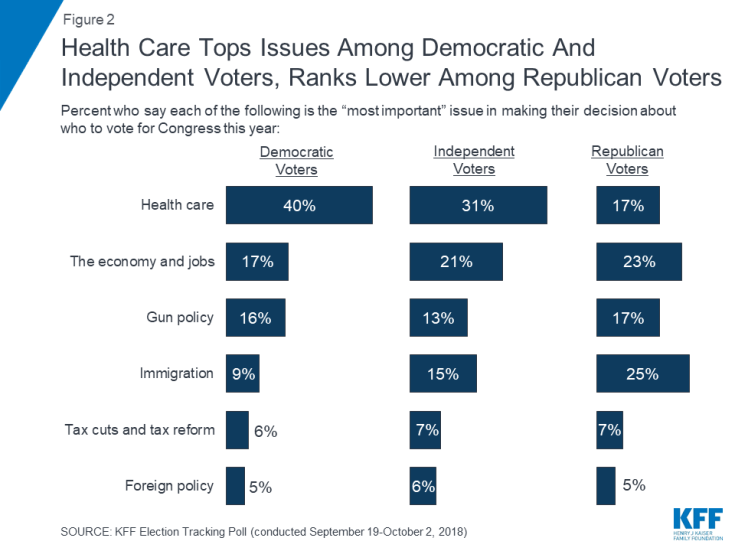
Figure 2: Health Care Tops Issues Among Democratic And Independent Voters, Ranks Lower Among Republican Voters
Health care is also the top issue chosen by voters who live in battleground areas (28 percent), ranking above the economy and jobs (22 percent), immigration (16 percent), gun policy (15 percent), tax cuts and tax reform (8 percent), and foreign policy (5 percent).
2018 Midterm Election Analysis
As part of Kaiser Family Foundation’s effort to examine the role of health care in the 2018 midterm elections, throughout the year we will be tracking the views of voters – paying special attention to those living in states or congressional districts in which both parties have a viable path to win the election. This group, referred to in our analysis as “voters in battlegrounds” is defined by the 2018 Senate, House, and Governor ratings provided by The Cook Political Report. Congressional and Governor races categorized as “toss-up” were included in this group. A complete list of the states and congressional districts included in the comparison group is available in Appendix A.
While health care is the top issue for voters living in battleground areas overall, similar to the national picture – the ranking of issues varies by partisanship. Nearly four in ten Democratic battleground voters (37 percent) chose health care as the “most important issue” in their voting decision for Congress this year as did three in ten independent battleground voters (28 percent), making it among the top issues for both groups. However, among Republican battleground voters, immigration is the top issue (29 percent) while health care ranks among other issues such as gun policy (16 percent) and the economy and jobs (15 percent).
| Table 1: Top Issues for 2018 Battleground Voters | ||||
| Percent who say each of the following is the “most important” issue in making their decision about who to vote for Congress this year: | All Battleground Voters |
Democratic Battleground Voters | Independent Battleground Voters | Republican Battleground Voters |
| Health care | 28% | 37% | 28% | 17% |
| The economy and jobs | 22 | 22 | 27 | 15 |
| Immigration | 16 | 11 | 11 | 29 |
| Gun policy | 15 | 16 | 15 | 16 |
| Tax cuts and tax reform | 8 | 7 | 8 | 12 |
| Foreign policy | 5 | 3 | 6 | 6 |
Although health care is a top issue for voters leading into the midterm elections, less than half of voters say they are hearing “a lot” from political candidates about specific health care issues. While a majority of voters say they are hearing “a lot” from political candidates about immigration (58 percent) and half say they are hearing “a lot” about the candidates’ support for or opposition to President Trump (48 percent), fewer voters say they are hearing “a lot” about health care issues such as the ongoing prescription painkiller addiction epidemic (38 percent), the 2010 health care law (35 percent), and continuing protections for people with pre-existing conditions (23 percent). Even fewer voters say they have heard about a national health plan, or Medicare-for-all plan (17 percent), the future of Medicare (17 percent), or unexpected or surprise medical bills (11 percent).
There are thirteen gubernatorial elections taking place this fall in states that have not expanded their Medicaid programs as part of the implementation of the 2010 Affordable Care Act (ACA); as well as four states where Medicaid expansion is on the ballot (Utah, Idaho, Nebraska, and Montana). In states without Medicaid expansion, few voters say they have heard “a lot” about this issue (15 percent).
Health Care Costs CONTINUE TO be top Health CaRE iSSUE for voters, VOTERS ALSO TALK ABOUT INCREASED ACCESS
As in previous KFF Tracking Polls, this month’s tracking poll continues to find health care costs as one of the top health care issues to voters. When voters who say health care is “very important” to their decision about who to vote for are asked to say in their own words what health care issue they mean, one-fourth (24 percent of all voters) offer health care costs including prescription drug costs. Voters also mention increasing access to health care (19 percent of all voters). Fewer voters mention opposition to or repealing the ACA (8 percent of all voters), Medicare or senior concerns (7 percent of all voters), or concerns about quality of coverage or care (5 percent of all voters). A small share of voters mention, either positively or negatively, single-payer or Medicare-for-all (4 percent of all voters).
Health care costs are also among the top health care issue offered by all partisan voters including about one-fourth of independent voters (27 percent) and Republican voters (23 percent), and about one-fifth of Democratic voters (22 percent). Other issues vary by partisanship with three in ten Democratic voters offering increased access (31 percent) as the most important health care issue while one-fifth of Republican voters (18 percent) offer opposition to/repealing the ACA.
Health Care Voters
Over the past six months, the Kaiser Family Foundation has been tracking a unique group of voters – health care voters. When asked how important a series of issues will be in their 2018 congressional vote choice, these voters say health care is the “most important issue.” The share of voters who are categorized as “health care voters,” has increased only slightly over the past six months, from 23 percent to 30 percent of all voters. To compare the demographic profile of health care voters to other voters, see our health care voter interactive.
2018 Voters Are Weighing Various Factors in Their Decisions
In addition to candidates’ position on issues, other factors could play a role in voters’ decisions about who to vote for this year. When asked which will play a bigger role in their voting decisions, six in ten voters (57 percent) say “the candidates’ positions on specific issues” will play a bigger role in their decision about who to vote for than “the broader political environment, including a candidate’s support for or opposition to President Trump” (38 percent). Larger shares of independent voters (64 percent) and Democratic voters (56 percent) prioritize the candidates’ positions on specific issues while Republican voters are more divided with similar shares saying candidates’ positions on issues (49 percent) and the broader political environment (48 percent) will play the biggest role. Voters in battleground areas also say they prioritize candidates’ positions on issues (58 percent vs. 38 percent).
Yet, majorities of voters say various political and candidate dynamics will be major factors in 2018. At least two-thirds of voters say the candidates’ character and experience (73 percent), which party controls Congress (66 percent), or the candidates’ support for or opposition to President Trump (66 percent) will be a “major factor” in their voting decision for Congress this year. Fewer voters say the same about the candidates’ political party (51 percent). Despite the recent attention to the increase in female candidates running in 2018, a majority of voters (78 percent) say the candidates’ gender is “not a factor” in their voting decisions.

Figure 7: Majority Of Voters Say Candidate Characteristics And Politics Will Be Major Factors In 2018 Vote
A larger share of Democratic voters (81 percent) say candidate dynamics such as their character and experience will be a “major factor” in their voting decisions compared to Republican voters (69 percent) and independent voters (68 percent). In addition, eight in ten Democratic voters say a candidate’s position on President Trump (79 percent) will be a “major factor,” compared to two-thirds of Republican voters and half (53 percent) of independent voters. Majorities of both Democratic voters (78 percent) and Republican voters (73 percent) say that political dynamics such as which party controls Congress as well as the candidates’ political parties will be major factors in voting decisions (63 percent and 62 percent, respectively).
| Table 2: Major Factors in 2018 Vote Vary by Partisanship | |||
| Percent who say each of the following is a major factor in their decision about who to vote for Congress: | Democratic voters | Independent voters | Republican voters |
| The candidates’ character and experience | 81% | 68% | 69% |
| The candidates’ support for or opposition to President Trump | 79 | 53 | 66 |
| Which party controls Congress, the Republicans or the Democrats | 78 | 52 | 73 |
| The candidates’ political party | 63 | 34 | 62 |
| The candidates’ gender | 10 | 4 | 4 |
Health Care Is Most Important Issue Among Voters In Bellwether States
In addition to this month’s KFF Health Tracking Poll, this report also includes two state-based surveys: Florida and Nevada. Both of these bellwether states have competitive Gubernatorial and Senate elections in which candidates are campaigning on various health care issues. According to a recent report from the Wesleyan Media Project, two-thirds of Nevada Senate and congressional campaign advertisements during September focused on health care issues as did one-fourth of Florida Senate and congressional campaign ads.1
Health care is the top issue among Florida voters (26 percent) and among the top issues for Nevada voters (24 percent), along with immigration (23 percent) and the economy and jobs (21 percent).
Similar to the national findings, when asked what they mean when they say health care is very important to their vote in 2018, Florida and Nevada voters most frequently mention health care costs. Three in ten Florida voters (29 percent) mention health care costs as do one-fourth of Nevada voters (24 percent). Health care costs were also among the most frequently mentioned health care issue across partisan voters in both bellwether states, but other issues in each of the states vary slightly across party identification.
Specific Health Care Issues May Drive Partisan Voters In Bellwether States
While health care is a top national issue, the role that candidates’ positions on specific health care issues play in elections can vary in states and by party identification. This month’s look at the role of health care in two bellwether states finds that majorities of voters in Florida and Nevada say they are more likely to vote for a candidate who wants to maintain the ACA’s protections for people with pre-existing conditions; voters are more divided on whether they would vote for a candidate who holds other health care positions.
A majority of Florida voters (69 percent) say they are more likely to vote for a candidate who wants to “maintain the ACA’s protections for people with pre-existing conditions” while few (9 percent) say they are more likely to vote for a candidate who wants to eliminate these protections, regardless of the fact that this may lead to increased costs for some healthy people.
On the other five health care issues provided, no one side of the position received majority support. About half of Florida voters say they are more likely to vote for a candidate who wants to expand Medicaid (49 percent), supports increasing regulation of prescription drug prices (47 percent), or wants to increase women’s access to reproductive health services (47 percent), in each case substantially larger than the share who say they’d be more likely to vote for a candidate who takes the opposite position. A slightly larger share of Florida voters (43 percent vs. 33 percent) say they are more likely to vote for a candidate who supports passing a national health plan, a proposal being pushed by Democratic gubernatorial candidate Andrew Gillum. When it comes to the ACA, Florida voters are divided with similar shares saying they are more likely to support a candidate who wants to repeal or protect the ACA.
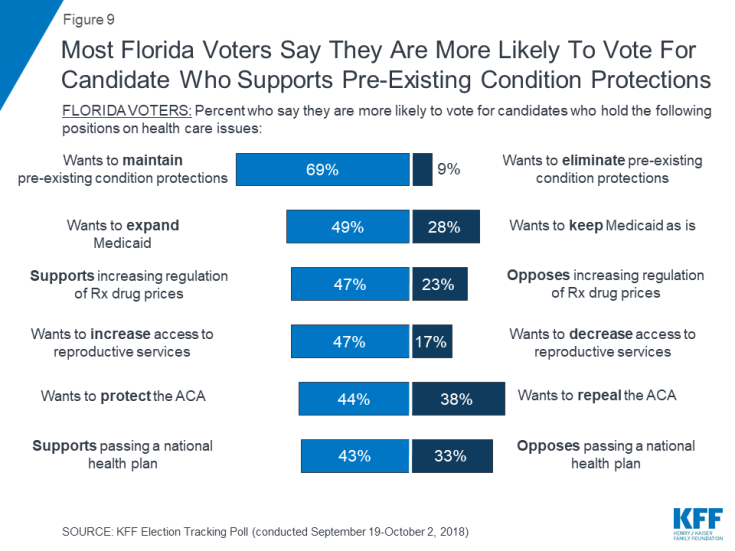
Figure 9: Most Florida Voters Say They Are More Likely To Vote For Candidate Who Supports Pre-Existing Condition Protections
Similarly, seven in ten Nevada voters (68 percent) say they are more likely to vote for a candidate who wants to maintain the ACA protections for people with pre-existing conditions. In addition, a slight majority of Nevada voters (53 percent) say they are more likely to vote for a candidate who wants to increase women’s access to reproductive health services while one in five (18 percent) say they are more likely to vote for a candidate who wants to decrease access.
Nearly half of Nevada voters also say they are more likely to vote for a candidate who wants to protect the ACA (47 percent) or supports passing a national health plan, or Medicare-for-all (47 percent), while about three in ten say they’d be more likely to vote for a candidate who takes the opposite position on each of these issues. Nevada voters are more divided on the regulation of prescription drug prices, with similar shares saying they are more likely to vote for a candidate who supports increasing regulation (39 percent) as opposes increasing regulation (32 percent).
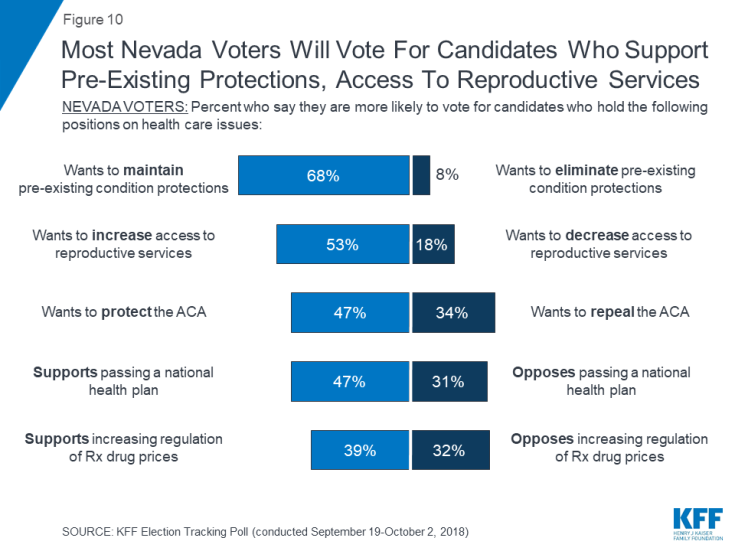
Figure 10: Most Nevada Voters Will Vote For Candidates Who Support Pre-Existing Protections, Access To Reproductive Services
Across Parties, Significant Shares of nevada and Florida Voters Say they Are More Likely to Vote for A Candidate Who Wants to Keep Pre-existing protections
Significant shares of partisan voters in Florida and Nevada say they are more likely to vote for a candidate who wants to maintain the ACA’s protections for people with pre-existing conditions – including majorities of Democratic voters (90 percent and 71 percent in Florida and Nevada, respectively), independent voters (73 percent and 72 percent, respectively), and a majority Republican voters in Nevada (60 percent) and nearly half of Republican voters in Florida (46 percent).
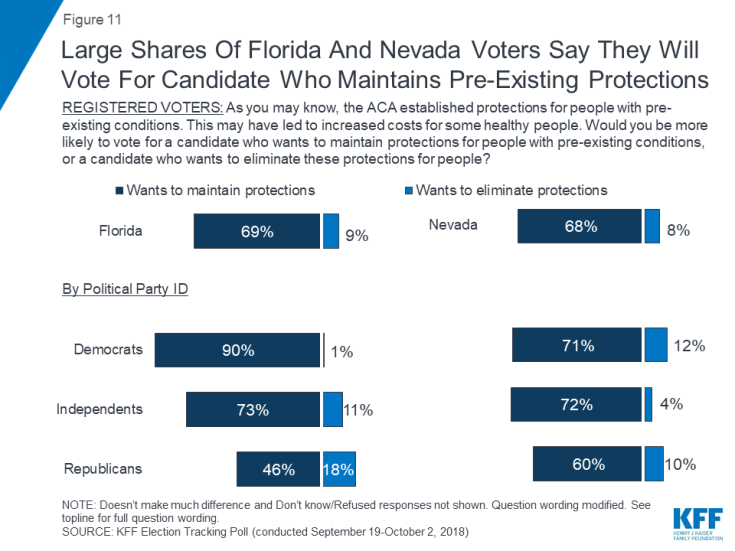
Figure 11: Large Shares Of Florida And Nevada Voters Say They Will Vote For Candidate Who Maintains Pre-Existing Conditions
One reason why maintaining the ACA’s protections for people with pre-existing conditions is a popular candidate position in both bellwether states may be because slightly more than half of Nevadans (55 percent) and Floridians (54 percent) live in households with someone who has a pre-existing condition. This is consistent with the share of the public overall who live in households with someone who has a pre-existing condition (53 percent).
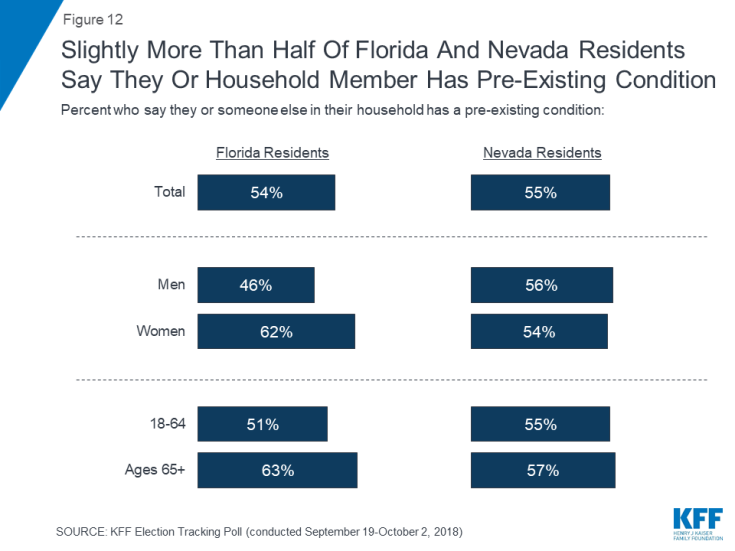
Figure 12: Slightly More Than Half Of Florida And Nevada Residents Say They Or Household Member Has Pre-Existing Condition
Partisan Voters Differ On Most Important health Care Positions
The KFF Tracking Poll also asked Florida and Nevada voters which of the provided health care positions was the most important to their vote choice this fall. No one position garnered majority support with partisans in both states selecting various party platforms as most important.
Three in ten Republican voters in Florida (31 percent) say repealing the ACA is the most important candidate position on a health care issue in determining their vote for Congress. On the other hand, nearly one-fourth of independent voters (23 percent) and two in ten Democratic voters (21 percent) in Florida say a candidate supporting a national health plan, or Medicare-for-all plan is the most important health care position for a candidate to take in determining their vote. The only health care position that ranks among the top three for all partisan voters in Florida is maintaining the ACA’s protections for people with pre-existing conditions with more than one in ten Democratic voters (18 percent), independent voters (15 percent), and Republican voters (12 percent) saying this is the most important position in determining their vote.
Similar to Florida, three in ten Republican voters (29 percent) in Nevada say repealing the ACA is the most important candidate position on a health care issue in determining their vote for Congress. On the other hand, a nearly similar share of Democratic voters (31 percent) say a candidate supporting a national health plan, or Medicare-for-all plan is the most important health care position for a candidate to take in determining their vote. For independent voters in the state, continuing the ACA’s protections for people with pre-existing conditions tops the list of candidate positions on health care issues (27 percent). Once again, maintaining the ACA’s protections for people with pre-existing conditions is the only health care position that ranks among the top three for all partisan voters in Nevada (24 percent of Republicans and 21 percent of Democrats).
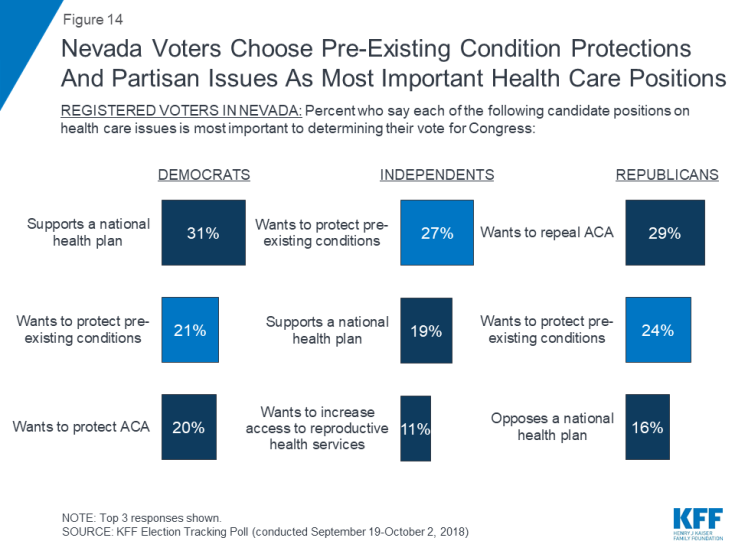
Figure 14: Nevada Voters Choose Pre-Existing Condition Protections And Partisan Issues As Most Important Health Care Positions
Medicaid Expansion in Florida
As of October 2018, Florida is one of 17 states who have not expanded their Medicaid programs.2 Majorities of Democratic voters (74 percent) and independent voters (53 percent) say they are more likely to vote for a candidate who “wants to expand Medicaid to cover more low-income uninsured adults” while a majority of Republican voters in the state (52 percent) say they are more likely to vote for a candidate who wants to “keep Medicaid as is.” Nearly one-fourth of Republican voters (22 percent) say that a candidate’s position on this issue doesn’t make a difference in their vote choice as do one-fifth of independent voters (19 percent) and one in seven Democratic voters (15 percent).
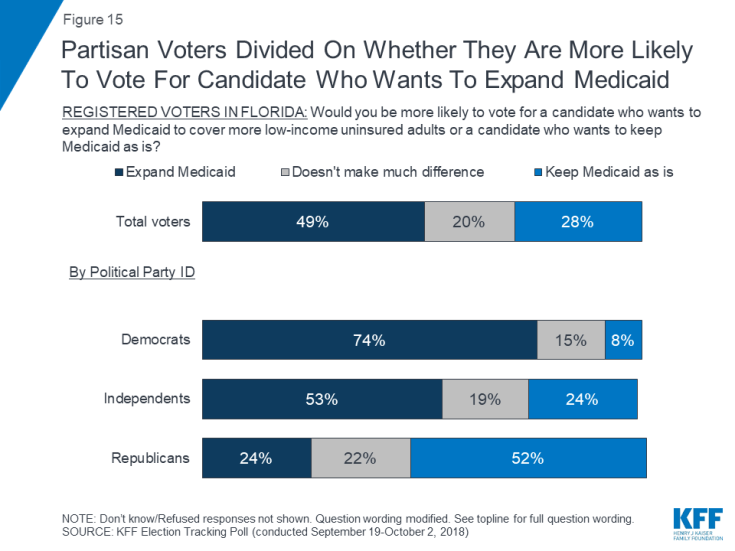
Figure 15: Partisan Voters Divided On Whether They Are More Likely To Vote For Candidate Who Wants To Expand Medicaid
Overall support for Medicaid expansion in Florida is similar to the share seen in other non-expansion states with nearly six in ten residents saying their state should expand Medicaid, while nearly four in ten say their state should “keep Medicaid as it is today.”
Larger Shares of Floridians Trust Democratic Gubernatorial Candidate To DO A Better Job On Health Care Issues
With competitive gubernatorial elections this fall, this poll also asked the public which gubernatorial candidate they trust on key health care issues. Overall, the Democratic candidate in Florida has a clear advantage on most health care issues while in Nevada, the Republican candidate has an advantage on some spending issues and the public is more divided on other issues.
When looking at the gubernatorial election in Florida, a larger share of Floridians say they trust Democratic candidate Andrew Gillum than Republican candidate Ron DeSantis to do a better job on health care issues – with some notable exceptions. Similar shares say they trust each candidate to do a better job of addressing the prescription painkiller addiction epidemic (37 percent vs. 34 percent, respectively) and controlling Medicaid spending (36 percent, for both). Floridians gave a slight edge to Gillum on improving rural health care (40 percent vs. 32 percent), and reducing health care costs (40 percent vs. 33 percent)
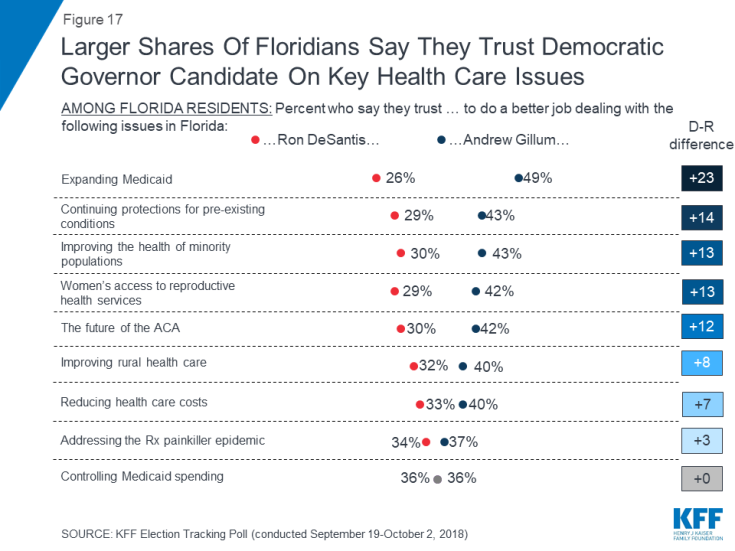
Figure 17: Larger Shares Of Floridians Say They Trust Democratic Governor Candidate On Key Health Care Issues
In Nevada, a larger share say they trust Republican candidate Adam Laxalt than his Democratic challenger Steve Sisolak to do a better job reducing health care costs (36 percent vs. 26 percent), addressing the prescription painkiller addiction epidemic (37 percent vs. 24 percent), and controlling Medicaid spending (40 percent vs. 22 percent). Nevadans are divided on which gubernatorial candidate they trust to do a better job on continuing the ACA’s protections for people with pre-existing conditions with one-third saying they trust Republican candidate Laxalt compared to three in ten who say they trust Democratic candidate Sisolak.
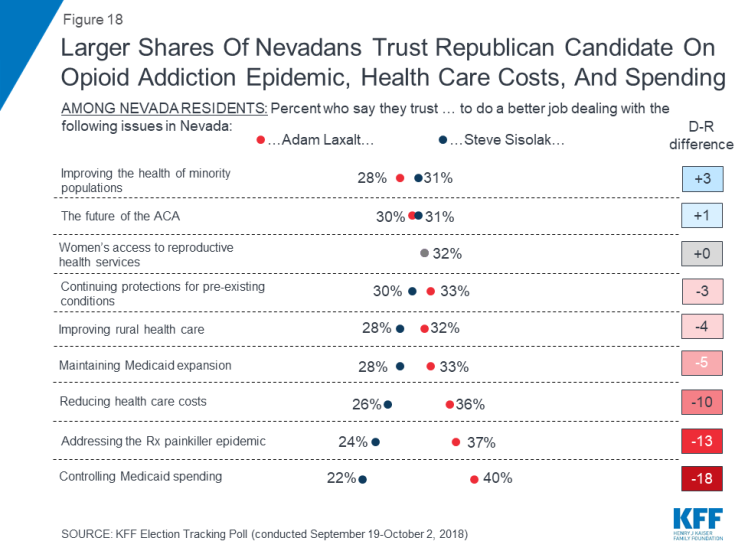
Figure 18: Larger Share Of Nevadans Trust Republican Candidate On Opioid Addiction Epidemic, Health Care Costs, And Spending
Women Voters in the 2018 Midterm Elections
One of the major narratives throughout this election cycle has been the impact that women voters may have on issues and candidates with ongoing attention to the #MeToo Movement especially in light of Justice Kavanaugh’s confirmation hearing and primary wins by female candidates. In July, the KFF Tracking Poll examined which women’s issues may be playing a role in voters’ decisions as well as the views of women 18-44 years old. The most recent tracking poll, which was conducted during the Senate judiciary hearings on allegations against Justice Kavanaugh’s finds that nearly half of women voters, overall, and women voters in Florida and Nevada are more enthusiastic about voting in this year’s election.3
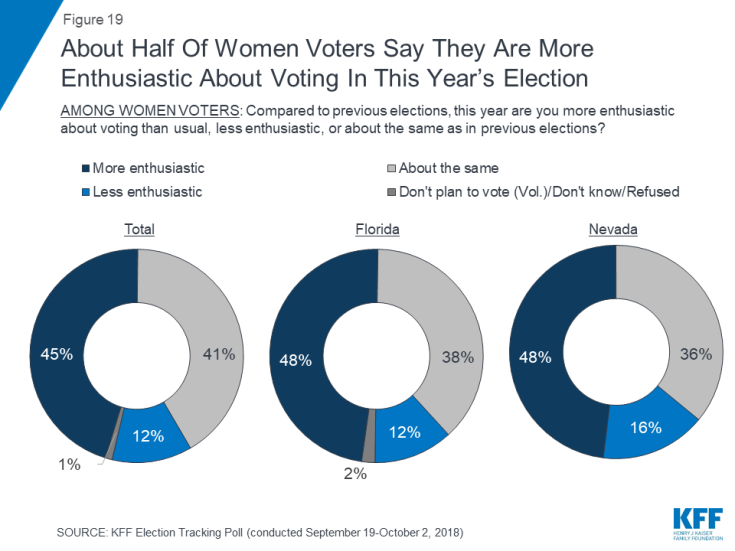
Figure 19: About Half Of Women Voters Say They Are More Enthusiastic About Voting In This Year’s Election
Nationally, independent women voters (30 percent) and Republican women voters (45 percent) are about as enthusiastic as their male counterparts (31 percent and 42 percent, respectively), while Democratic women voters report slightly higher levels of enthusiasm about voting in this year’s election (55 percent) compared to Democratic men voters (48 percent). Across the board, enthusiasm about voting is higher in 2018 than it was in the last midterm elections in 2014.
Yet, few women voters say the candidates’ gender will be a major factor (6 percent) in their decision about who to vote for Congress this year. One in five (19 percent) say the candidates’ gender will be a minor factor while three-fourths say it won’t be a factor. This is similar across women voters, regardless of party identification with seven percent of Democratic women voters saying the candidates’ gender will be a major factor compared to four percent of Republican women voters and independent women voters.
Health care is among the top issue for women voters regardless of party identification and across states. More than one-third of women voters overall (36 percent) say health care is the most important issue in deciding who to vote for Congress – including four in ten Democratic women voters (43 percent) and independent women voters (38 percent) and one-fifth of Republican women voters (22 percent).

